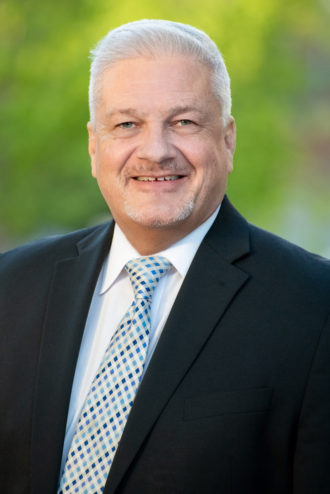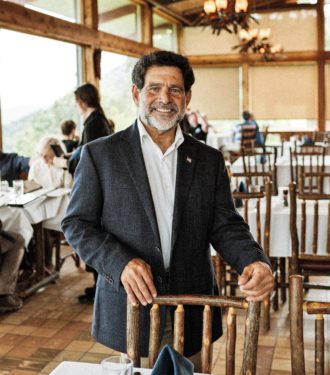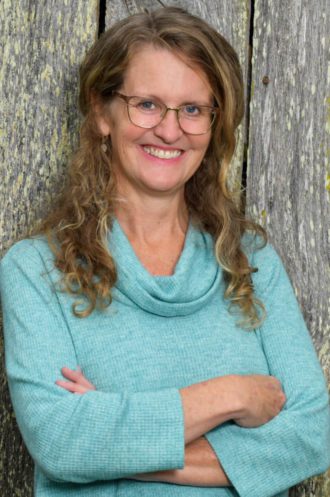The 2024 Buncombe County Board of Commissioners races are unusual for their variety: There is a race for the open commission chair featuring an incumbent commissioner; a commission seat race featuring an incumbent; and another commission seat race with two candidates who are new to public office.
After 12 years on the Buncombe County Board of Commissioners, serving his final eight as chair, Brownie Newman is not running for reelection. Democrat Amanda Edwards, who represents District 3, faces unaffiliated Van Duncan, the former Buncombe County sheriff, for the chairmanship.
“Serving my 12 years as sheriff, I learned how valuable it is to be collaborative and inclusive in decision-making,” says Duncan. “I strongly feel that it is necessary to set a clear vision for the county and be detailed in how we plan to get there. To formulate that vision we must involve the community in every step. This will require much more community engagement at a commissioner level, especially at the commission chair level. I definitely would be more involved in commission business when it comes to setting a clear, attainable vision for Buncombe County. It should be the responsibility of anyone in that position to take the lead role in facilitating and planning the process for which those decisions are made.”
Meanwhile, Edwards notes her experience as an executive director for three organizations — the Red Cross, the Literary Council, and her current role at A-B Tech Foundation — distinguishes her in terms of focus. Additionally, she says, “My six years as a commissioner, leading in accountability and transparency, drawing on my master’s in public administration, likewise sets me apart. My diverse service and advocacy, from membership in the Children’s Wellbeing League to the UNCA Alumni and YWCA boards, and base of support are broader than past chairs and my opponent. I’m attentive, values-driven and collaborative — and Brownie is, too!”
The race in the redrawn District 1 will provide a fresh face to the board. The matchup is between minister and life coach Republican Paul Benjamin and registered nurse and small-business owner Democrat Jennifer Horton.
The District 2 race matches up Democratic Commissioner Terri Wells (who was elected to District 1, but her district has been redrawn) against Pisgah Inn owner Bruce O’Connell, unaffiliated. Commissioner Jasmine Beach-Ferrera, who was elected to District 2, is not running for reelection.
Lastly, Democrat Parker Sloan, who has represented District 3 since 2020, is running unopposed.
Editor’s note: Xpress reached out to this year’s candidates prior to the devastation our community experienced from Tropical Storm Helene. Please keep this in mind as you review our 2024 Voter Guide.
Buncombe County Board of Commissioners Chair
Van Duncan

Website: vanduncanforcommissionchair.com
Occupation: Investigator for Biltmore Company Police
Previous offices held: Three-term Sheriff of Buncombe County
Key endorsements: None provided
Amount of money raised: $176,000 from 560 donors, with 85% under $100
Top three donors: David Luck, Rusty Pulliam, Chris Peterson
Party: Unaffiliated
Some commissioners have publicly discussed the possibility of seeking a bond in 2026 to help fund more affordable housing. Do you agree with the bond issue? Are there other things the county could be doing to address the affordable housing crisis?
This is alarming to me. After a $28.5 million budget shortfall, taking $12 million from the fund balance and giving a tax increase to fix, now is not the time to be issuing more debt. It is time to look at finding waste and reducing cost. With the current high interest rates, it is not in our best interest, even though affordable housing is a very important issue for our county. We should first encourage contractors to build here by looking at our permitting processes that cause delays and drive up building costs. Maybe we should look at infrastructure incentives to encourage more building without having to issue debt.
What can the county do to improve public education?
This is a very complex issue and one of my highest priorities. I would work very closely with the school board and superintendent to find savings where we could without affecting teacher pay. I would be in support of raising teacher pay to retain our educators and support the county’s efforts to supplement teacher pay. This is one of the toughest issues the county and our school system face and should be a top priority for the commission and the school board. We have to keep our educators, provide quality education and make the amount we spend on it something that our taxpayers can afford. Very challenging.
What is the most important tool at the county’s disposal to help mitigate the effects of climate change? How would you advocate to best make use of that tool?
The most successful initiative was the implementation of propane-fueled vehicles to the county’s fleet. We initiated that during my time as sheriff, and though not without its problems, it gave us a workable solution to reducing our carbon footprint. Hybrid vehicles did much of the same. Fully electric vehicle technology is not to the point of making it a reliable fleet vehicle as demonstrated by the city’s electric bus failure. Solar has had some success in the county, but I would want to look closely at the data before investing further.
How would you work to improve coordination between the various arms of county government affecting public safety, including but not limited to law enforcement?
I support the idea of the co-responder program in responding with mental health resources and law enforcement. Mental health issues are at the crux of many calls for service that law enforcement responds to, and incorporating efforts makes the most common sense. During my previous tenure as sheriff, partnerships with our state, local and community partners were at the forefront of everything we did and pivotal to the success we enjoyed. I would point to the Family Justice Center and our COPS team programs as examples of this. Buncombe does well on most fronts in coordination of efforts, but I definitely think improvement could be made.
In what areas does the county overspend, and in what areas does the county underspend?
I think the current commission fails to set clear budgeting priorities. For me, that is core services, infrastructure that the county is responsible for and education. These three things make up over 80% of the county’s current budget. Beyond that, we have to examine how what we invest in programming and the actual return on investment it brings the county. Not having a first-things-first mentality left the commission scrambling this year to fix a budget shortfall and debating having to cut COLA raises for county employees and school nurses at the charter schools. A clear vision on where we are headed as a county and a plan on how we are going to fund it needs improvement.
Amanda Edwards
Website: www.electamandaedwards.com
Occupation: Executive director, A-B Tech College Advancement; past executive director of WNC Red Cross; and the Literacy Council of Buncombe County; trained in management (master’s degree in public administration); extensive board and volunteer service throughout our community.

Previous candidacy or offices held: Currently serving as Buncombe County Commissioner, elected twice since 2018
Key endorsements: Sierra Club, Public School Strong Voters, Center for Biological Diversity, Everytown for Gun Safety, Moms Demand Action, the Asheville City Association of Educators, Buncombe County Association of Educators and N.C. Retired School Personnel
Amount of money raised: $65,375
Top three donors: George Beverly, John Winkenwerder, Steve Baumohl
Party: Democrat
Some commissioners have publicly discussed the possibility of seeking a bond in 2026 to help fund more affordable housing. Do you agree with the bond issue? Are there other things the county could be doing to address the affordable housing crisis?
Our current affordable housing bonds, which voters passed in November 2022, are driving a lot of great projects. New residential housing construction is happening as a direct result of those bonds. I am in favor of monitoring and ensuring effective oversight and creating as much of the promised housing as possible through those bonds before launching conversations about a second affordable housing bond. I want to make sure that we confirm what value we are getting from the 2022 bonds, that we are on track to get thousands of people in new, safe housing, and learn from that bond process.
What can the county do to improve public education?
With the help of voters around the state, we can lobby the N.C. General Assembly to fully fund public education. Through our voices and votes, we must tell the legislature to take two steps first: increase teacher pay to restore us to best in the nation and stop diverting millions of public school dollars to private religious schools (and other beneficiaries of vouchers). At the local level, I’ve voted with our commission to double our local investment in our schools. It’s past time for the legislature to stop withholding our state tax dollars from public education.
What is the most important tool at the county’s disposal to help mitigate the effects of climate change? How would you advocate to best make use of that tool?
Our people — compassionate, caring residents right here in Buncombe — are our greatest means for accomplishing this ongoing task that we have just begun to address. We care about each other regardless of our differences. We are willing and able to communicate and collaborate on the issues that impact our daily lives and that create risks for future generations. We have adopted the use of the term resiliency and are incorporating emergency preparedness for resiliency. We touched on this in our comprehensive plan. I advocate for even more collaborative, inclusive leadership to best use our spirit of cooperation, caring and service.
How would you work to improve coordination between the various arms of county government affecting public safety, including but not limited to law enforcement?
I work closely with Sheriff (Quentin) Miller on public service initiatives and am proud to have his endorsement and to be able to count on Sheriff Miller’s commitment to improving coordination among law enforcement agencies throughout the county. I’m proud to be able to count on leaders of our EMS and fire departments for their willingness to coordinate; I’ve been collaborating effectively with our emergency services since serving as director of the WNC Red Cross. I advocated for consolidating 911 calls, creating the co-responder program (sending the right help to a call), community paramedics and increasing pay for deputies and paramedics.
In what areas does the county overspend, and in what areas does the county underspend?
Overspending: Rising costs impact what the county pays for fuel, which is why moving to hybrid vehicles that get excellent gas mileage without compromising necessary performance features is a practical and cost-effective strategy. The rising costs of vehicles themselves are causing our fleet management to cost more than we had budgeted — which people around our county have likely experienced themselves if they’ve needed to replace a vehicle since March 2020. For that reason, leasing could save us money and take us out of the overspend category. Underspending: wages for our lowest-paid staff, community paramedics, co-responder program, age-in-place programs.
Buncombe County Board of Commissioners District 1
Paul Benjamin
Website: Renewbuncombe.com
Occupation: Minister, life coach and consultant
Previous candidacy or offices held: None
Key endorsements: Local leaders
Amount of money raised: $5,000
Top three donors: Small donors
Party: Republican
Some commissioners have publicly discussed the possibility of seeking a bond in 2026 to help fund more affordable housing. Do you agree with the bond issue? Are there other things the county could be doing to address the affordable housing crisis?
We have other options for building and addressing this issue. We seem to keep adding more taxes to burden our families and seniors on a fixed income. With the current $28 million deficit in the county, we need to address the wasteful spending before making a move.

What can the county do to improve public education?
We need to get back to the basics! Our schools are ranked 49th in the state. [Editor’s note: Rob Jackson, superintendent of Buncombe County Schools (BCS), in August cited a study from the nonpartisan think tank Public School Forum that ranked North Carolina 49th among states in percentage of its gross domestic product allocated to public education.] Our teachers should be paid a fair wage, and students must feel safe and not pressured to conform to the local and national social indoctrination.
What is the most important tool at the county’s disposal to help mitigate the effects of climate change? How would you advocate to best make use of that tool?
The Bible says in (Genesis 8:22) “While the earth remains, seedtime and harvest, cold and heat, summer and winter, day and night shall not cease.” We will always have (climate change) while the earth is here. Our best tool is to be good stewards by reducing the tax burden and overregulation on families and businesses in our community.
How would you work to improve coordination between the various arms of county government affecting public safety, including but not limited to law enforcement?
Each government leader needs to remember that they are called to serve the families in our community. Law enforcement needs to be well funded and staffed to accomplish their job, and leaders should work as a team to improve the lives of the families we serve. I will work to bring leaders back to our core purpose, serving the families in our county.
In what areas does the county overspend, and in what areas does the county underspend?
We are wasting taxpayers’ money on nonproductive social programs, such as DEI, reparations and others that do not work.
Jennifer Horton
Website: www.electjenniferhorton.com
Occupation: Registered nurse and owner of Living Waters Enterprises, the controlling company for five assisted living facilities in Asheville
Previous candidacy or offices held: N/A
Key endorsements: Jennifer Pickering, Cameron Maybin, Karen Sanders, Sierra Club, Public School Strong, Buncombe County Association of Educators, Asheville City Association of Education, N.C. Retired School Personnel, many individuals in our community
Amount of money raised: $17,000
Top three donors: Kamali Horton, Montreat, family and friends
Party: Democrat
Some commissioners have publicly discussed the possibility of seeking a bond in 2026 to help fund more affordable housing. Do you agree with the bond issue? Are there other things the county could be doing to address the affordable housing crisis?

I support the discussion around seeking a bond in 2026 to help fund more affordable housing. Addressing the housing crisis in Buncombe County is critical, and a bond could provide much-needed resources to create affordable housing options for our community.
In addition to the bond, the county should explore other strategies, such as partnering with private developers to incentivize affordable housing projects, revising zoning regulations for more flexible housing options and creating land trusts to protect affordable housing from market pressures. We also need to focus on protecting renters from displacement and ensuring equitable access to housing resources for residents.
What can the county do to improve public education?
The county can improve public education by addressing academic needs and student well-being. Key strategies include increasing funding for schools, especially in underserved areas, to provide adequate resources for infrastructure, technology, classroom supplies and mental health services. Supporting teachers with competitive salaries, benefits and training in mental health awareness will better equip them to help students. Investing in early education programs like universal pre-K and strengthening Career and Technical Education (CTE) through partnerships will prepare students for diverse career paths. Enhancing mental health resources and fostering community involvement will create a comprehensive student support network.
What is the most important tool at the county’s disposal to help mitigate the effects of climate change? How would you advocate to best make use of that tool?
The county’s comprehensive plan is the county’s most important tool to mitigate climate change. These policies shape sustainable development, natural resource preservation and energy use. I advocate for revising zoning laws to promote green building, renewable energy and eco-friendly infrastructure, reducing our carbon footprint. Protecting forests, wetlands and agricultural land is vital for carbon absorption, and conservation easements can safeguard these areas. Zoning should also facilitate renewable energy projects and prioritize mixed-use developments near transit hubs to reduce car dependency. The county can significantly reduce its environmental impact and advance climate action efforts by leveraging these strategies.
How would you work to improve coordination between the various arms of county government affecting public safety, including but not limited to law enforcement?
Improving coordination between county agencies impacting public safety — law enforcement, emergency services, mental health and social services — requires a strategic, collaborative approach. I would advocate for regular interagency meetings to enhance communication, share data and develop joint strategies. A centralized public safety task force could oversee policy alignment and emergency preparedness. Investing in shared technology systems for real-time coordination is crucial. Expanding Crisis Intervention Teams (CIT) and co-response models would integrate mental health professionals with law enforcement, improving outcomes. Lastly, engaging the community through town halls or forums can foster collaboration and ensure public safety efforts meet community needs.
In what areas does the county overspend, and in what areas does the county underspend?
Addressing overspending is important; therefore, reallocating funds to address critical underspending should be prioritized. By streamlining unnecessary expenses, we can focus on areas like mental health services, which need more funding for crisis intervention, counseling and preventive care to improve well-being and reduce strain on emergency services.
Affordable housing requires greater investment to combat homelessness, and public transportation, especially in rural areas, needs expansion for better accessibility and reduced emissions. Education and early childhood programs also require more support to prepare the next generation. As a registered nurse and lifelong Buncombe County resident, I’m ready to address these needs.
Buncombe County Board of Commissioners District 2
Bruce O’Connell
Website: Bruceoconnell.com
Occupation: Owner and operator of Pisgah Inn on the Blue Ridge Parkway
Previous candidacy or offices held: Ran for U.S. Congress in 2022
Key endorsements: None provided
Amount of money raised: Not provided
Top three donors: Not provided
Party: Unaffiliated
Some commissioners have publicly discussed the possibility of seeking a bond in 2026 to help fund more affordable housing. Do you agree with the bond issue? Are there other things the county could be doing to address the affordable housing crisis?
Don’t be fooled, a bond is simply a long-term debt. We already have approximately $350 million in bond-type debt secured by a commitment to increase tax revenue to repay it. If taxes go up, the rental property owner raises the rents he charges. Residents who own their own homes face tax increases, leaving them less money for food, fuel and medicine. My point is that a bond may not be the best approach. Streamlining regulations, easing the permitting process, increasing the speed for issuance of permits and approvals, and offering tax breaks to builders will offer relief without driving up taxes.

What can the county do to improve public education?
Our commissioners have limited influence on public education. We cover the cost of supplemental pay for teachers, capital expenses and hiring costs. Most of the money for public education comes from the state. As a commissioner, I would encourage funding for improved building maintenance, which makes for a safer and better learning environment. Also, I would promote shifting county tax monies from less essential projects and use that money for increases in supplemental teacher pay to reward exemplary performance (merit-based pay). I would establish and build better relationships with our state legislators to maximize the funding help we get from Raleigh.
What is the most important tool at the county’s disposal to help mitigate the effects of climate change? How would you advocate to best make use of that tool?
Forty-five years as a hotel operator in a national park has taught me the importance of protecting and preserving the environment. My record at Pisgah Inn illustrates my exemplary commitment to the environment. There is a delicate balance between preservation and use of our resources, and I have learned to achieve that balance. The county can be pro-environment and be pro-business/development at the same time. This requires a commonsense, balanced approach to green investments and open-space preservation. The county can set an example by budgeting funds for commonsense green projects that can demonstrate a payback for the taxpayers.
How would you work to improve coordination between the various arms of county government affecting public safety, including but not limited to law enforcement?
The emergency responders, the fire department, the police and the sheriff department should be coordinated and cooperative. There needs to be a common system of communication which will help these departments work together. Leadership in these departments should be proactively working together and meeting on a regular basis. Certain expenses like vehicles, equipment, manpower and buildings need to be shared where possible. The co-responder program is an excellent example of sharing resources. The sheriff’s department’s helping out with downtown patrols is another good example of cooperation. I will encourage similar programs and out-of-the-box thinking.
In what areas does the county overspend, and in what areas does the county underspend?
The county budget is full of overspending and waste and is $28.5 million in the red. I have met with the county manager and have pending requests for explanations about questionable disbursements. Taxes just went up and next year, the county will raise the property values (through revaluation), likely increasing taxes again. Tax increases drive up the cost of rent and property prices. We have a spending disease that can only be cured with new leadership focusing on what matters most. We do not have the funds for everything we may want, but we do have enough for what we need.
Terri Wells
Website: www.terriwellsforcommissioner.com/
Occupation: Former teacher, farmer and WNC Communities regional ag and community director
Previous candidacy or offices held: Serving as Buncombe County commissioner since elected in 2020
Key endorsements: WNC Sierra Club, BCAE/ACAE/NCRSP and teachers, farmers and community leaders which you can view at www.terriwellsforcommissioner.com/endorse
Amount of money raised: $77,000 with more than 300 people contributing.
Top three donors: Steven Baumohl, Ken Brame, Terry Van Duyn
Party: Democrat
Some commissioners have publicly discussed the possibility of seeking a bond in 2026 to help fund more affordable housing. Do you agree with the bond issue? Are there other things the county could be doing to address the affordable housing crisis?
The voters strongly approved the 2022 bonds, with a 69% approval for the $30 million open-space bond and a 62% approval for the $40 million housing bond. I am pleased to report that two-thirds of that funding is already being invested in priority projects to positively impact our community. My first step for a 2026 bond would be to continue to listen to residents to understand their priorities and assess the viability of seeking additional funding in 2026 to invest in projects that benefit our community. I will continue to challenge staff to explore various approaches to address our housing needs.

What can the county do to improve public education?
We must continue to hold high standards for our schools and to fight for fully funded public schools in our state budget. During my four years as commissioner, we have increased funding for education by $34 million, the largest increase in more than a decade. This funding increases salaries and pays for additional staff that the state does not fund. I visit our schools regularly, and as a former educator, I witness high student engagement and a supportive and challenging classroom environment. Strong public schools help build strong communities; we must continue to invest in our next generation.
What is the most important tool at the county’s disposal to help mitigate the effects of climate change? How would you advocate to best make use of that tool?
Residents regularly share their concerns about how climate change is impacting our community, and they deserve our attention. By prioritizing county investments, we can mitigate climate impacts and increase community resilience. While serving on the county’s Environmental and Energy Stewardship Subcommittee, I advocate for strategic investments in land conservation, solar energy, battery storage, clean water, organics waste diversion, composting and EV infrastructure to ensure that we have a stronger future for our children and grandchildren. Additionally, the focus and investment we make now in ensuring we have healthy and strong agricultural and food systems will pay dividends for years to come.
How would you work to improve coordination between the various arms of county government affecting public safety, including but not limited to law enforcement?
I am passionate about better coordination to improve our safety, and at the same, reduce direct costs to the county. While I have worked to provide a 40% increase in funding for public safety during my four years as a commissioner, I am also championing innovative programs that save money while at the same time improving our quality of life. Community paramedics reduce costly ambulance rides while saving lives. Co-responders connect people in crisis to social workers and mental health treatment, freeing law enforcement and EMS to respond to other emergencies.
In what areas does the county overspend, and in what areas does the county underspend?
My job as commissioner is to be in regular contact with our residents so I get plenty of input on where to prioritize funding. While everyone clearly wants the county to be efficient, they are most concerned about effective services. I rarely hear residents highlight specific areas we overspend. Most residents want more services — better schools, a safer community, a healthier community and a variety of services such as public libraries and job creation programs. I am glad that the commissioners make funding decisions based on the county’s strategic plan so that we are consistent and fair to all.
Editor’s note: To look up which races you will vote for, visit avl.mx/6nq.






Before you comment
The comments section is here to provide a platform for civil dialogue on the issues we face together as a local community. Xpress is committed to offering this platform for all voices, but when the tone of the discussion gets nasty or strays off topic, we believe many people choose not to participate. Xpress editors are determined to moderate comments to ensure a constructive interchange is maintained. All comments judged not to be in keeping with the spirit of civil discourse will be removed and repeat violators will be banned. See here for our terms of service. Thank you for being part of this effort to promote respectful discussion.